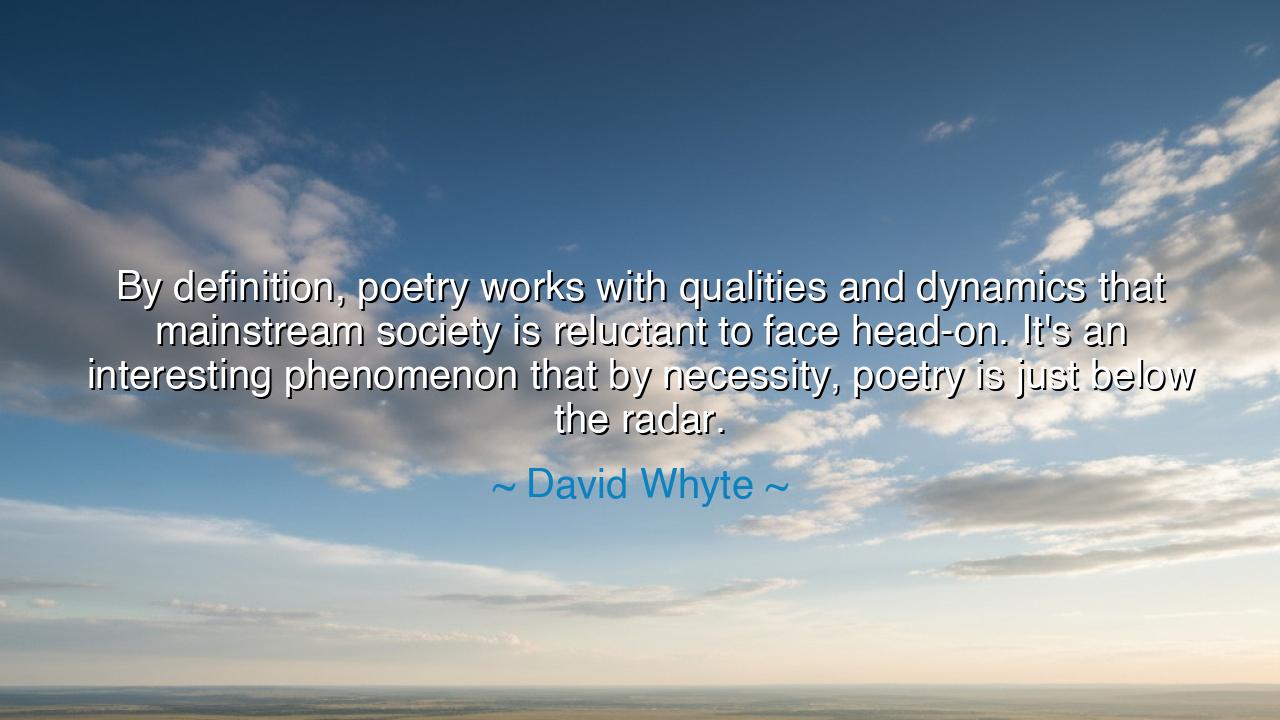
By definition, poetry works with qualities and dynamics that
By definition, poetry works with qualities and dynamics that mainstream society is reluctant to face head-on. It's an interesting phenomenon that by necessity, poetry is just below the radar.






The poet David Whyte speaks with a voice both subtle and piercing when he declares: “By definition, poetry works with qualities and dynamics that mainstream society is reluctant to face head-on. It’s an interesting phenomenon that by necessity, poetry is just below the radar.” In this saying lies the truth of why poetry has always been feared and revered, loved and ignored. For poetry is the tongue of the heart, the unguarded whisper of the soul, the mirror that dares to show what polite words conceal. Where society builds walls of convention, poetry slips beneath the cracks, carrying truths that no law can silence, no market can price, and no empire can fully tame.
From the dawn of ages, poetry has dwelt in the hidden places. The psalms of prophets, the odes of Homer, the songs of wandering minstrels—all spoke of sorrow, of longing, of death, of ecstasy—things which mainstream society would rather sweep into shadows. The soldier’s grief after battle, the lover’s trembling, the beggar’s hunger—these are not the matters of councils and courts. Yet the poet sings of them, because in them is the marrow of human life. Society avoids such depths, for they unsettle the smooth mask of order. And so, as Whyte tells us, poetry lives below the radar—close enough to move us, but hidden enough to survive.
Consider the story of Anna Akhmatova, the Russian poet who lived under the iron grip of Stalin. Her words, delicate yet unyielding, gave voice to suffering that the state sought to erase. She could not publish freely; she often recited her poems in whispers, and friends memorized them, so the written copies could be burned to avoid arrest. The society of her day wanted silence, compliance, and cheerful illusions. But poetry, moving beneath the radar, carried the truths of grief, despair, and resilience. Through this hidden endurance, her words outlived the tyranny that sought to erase them. This is the power that Whyte names—the power of poetry to speak the forbidden truths of life.
Why is society so reluctant to face these truths? Because they remind us of our fragility. To read poetry is to be confronted with mortality, with failure, with longing, with love that cannot be contained. It breaks through the armor of daily busyness and shows us the cracks in our being. A marketplace thrives on distraction, a government thrives on control, but poetry thrives on unveiling what is unspoken. And so, it is pushed to the margins, where it flourishes quietly, waiting for hearts willing to listen.
Yet this very hiddenness is poetry’s strength. By remaining just below the radar, it resists being tamed by politics or commerce. It is not a tool for power, but a current of truth flowing beneath power’s foundations. It reaches those who are willing to pause, to feel, to be pierced by beauty and truth. Like a spring in the desert, it appears in places unexpected, and its water restores those who thirst for meaning. To dismiss it as impractical is to misunderstand its divine cunning: poetry changes societies not by shouting in the marketplace, but by transforming the soul in silence.
The lesson is clear: do not wait for society to hand you its truths, for it will often hand you only half-truths. Instead, seek out the poetry that lies beneath the noise. Read the verses of Rumi and let them remind you of the soul’s hunger. Recite the words of Maya Angelou and feel the power of courage against injustice. Write your own lines, not for fame, but to confront the shadows within your own heart. Poetry is not entertainment; it is initiation, a passage into deeper seeing.
Practical action begins simply: read one poem each day, slowly, aloud if possible, letting the rhythm break open the hardened places of your spirit. Keep a small journal, not of polished verse, but of fragments—images, questions, cries—that arise from within. Share poems in community, for when a verse is spoken aloud, it ceases to be one person’s truth and becomes a bond among many. In these small practices, you will find that you are training yourself not only to hear poetry, but to live more truthfully.
Thus, hear David Whyte’s wisdom as both warning and invitation: poetry will never sit at the center of society’s banquet, but it will always be the hidden fire warming its edges. If you would live not merely as a cog in the machine, but as a full human being, seek out that fire. Walk below the radar with poetry in your heart, and you will find strength to face what others fear, and wisdom to see what others cannot.






AAdministratorAdministrator
Welcome, honored guests. Please leave a comment, we will respond soon